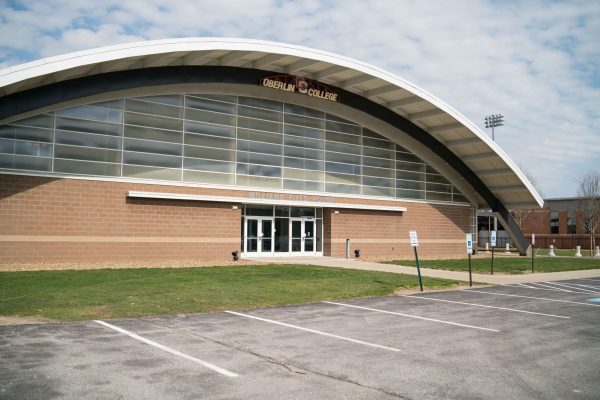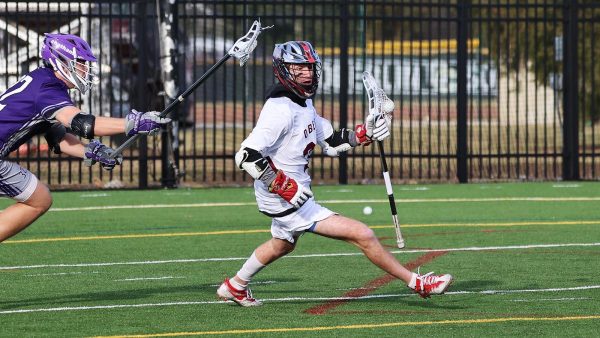Reflections of a Former Student-Athlete Rower
In high school, I competed as a member of the rowing team. Unfortunately, as Oberlin doesn’t have a rowing team, I’ve retired my unisuit and taken up life as a non-athlete. Through that process, I’ve been surprised by which aspects of being an athlete I miss and which I don’t.
The most striking thing I miss is the team dynamic. Your teammates see you at your lowest, when you’ve given up and are puking on the floor. But they’re also there to share your greatest triumphs and accomplishments. Going through those moments with others causes you to form a unique bond.
There’s also the bond formed just by spending large amounts of time together. Rowing, as a team sport, demonstrates this clearly. You have the power to single handedly slow down the whole boat, and one person can’t carry the whole team to victory. As such, everyone must rely on and trust each other to work hard for the success of the boat. As a result, you love every other member of your team because you appreciate them for the efforts they’ve put in to help you win. And they all appreciate you for the effort you’ve put in to help them win. There’s no greater feeling than knowing you’re making a difference in someone’s life. That mutual feeling of appreciation is hard to find in other places.
The other thing I miss about being on a sports team is the competitive spirit athletics instills in you. Being a competitive athlete forces you to always think about how you can improve yourself and your skills. This mentality carries over into other aspects of your life. It shows up as a drive for self-improvement — you want to do more than rest on your laurels.
Once I stopped being an athlete, I found myself becoming very averse to competition. Oftentimes I don’t apply for fellowships, internships, scholarships, or other opportunities that I was qualified for, just for fear of failure. Being an athlete served as a reminder that I could work to improve myself. It reminded me that I could be competitive. And most of all, it made me comfortable with losing, because you’re undoubtedly going to lose some races in a regatta or have a bad training day. It reminded me that the path to success isn’t a straight line but a series of detours along the way that require constant course correction to keep you on the right path.
As someone who struggles with concentration and focus, rowing really helped me be productive when I was in high school. I didn’t row my senior year of high school, and I remember struggling to get things done, even though I had way more time to work. Studies have shown that the endorphins and hormones released by regular exercise — specifically dopamine — really help people with ADD and attention difficulties. Rowing in particular requires a lot of concentration while doing a repetitive task. It helped me train my mind to remain focused for longer periods of time, something I lost when I stopped rowing. In addition, the strenuous exercise left me very tired at night, forcing me to get good sleep. Training also made me hungrier, causing me to eat more and, in the spirit of wanting to be as competitive as possible, it also spurred me to eat healthily. Thus, rowing forced me to get good exercise, sleep, and food — all things I now struggle with in college.
Of course, there are also things I’m grateful I don’t have to do since I stopped being an athlete.
The time commitment is an obvious starting point. Indeed, rowing has a little bit more of a time commitment than many other sports. In high school, we had after-school training Monday to Saturday, as well as morning training three times a week. Because most regattas happened on Sundays, during the main season I was spending more than three hours every day on rowing-related tasks — probably averaging about four hours a day.
Also, unlike other sports, we were always in season. Fall was head-race season, which is a longer race than the standard 2,000-meter, winter was indoor rowing season, which is just as competitive and even more intense than rowing on the water, and then spring was regular race season. In addition, because my high school was in Canada and the water would still be frozen in the spring, we had to use our spring break to drive down to Miami where it was warm, so we could get a head start on our training.
Another thing I don’t miss is rowing’s masochistic culture. Rowers pride themselves on competing in a grueling and painful sport. However, this becomes toxic when avoiding pain is seen as antithetical to being a “real rower.” That is why it wasn’t an uncommon sight for people to puke on the ergometer and keep on rowing unfazed, without taking a second to breathe. Most of us looked at our bleeding and callused hands as a source of pride, often comparing scars as way of showing our legitimacy and embodiment of the rowing spirit.
There are many things I miss about being an athlete, and I look back fondly on that part of my high school experience. And I’m still on the journey to find other things to fill the gap left by leaving rowing. Ultimately, I am happy and proud of who I am and the activities that I do now as a non-athlete at Oberlin College.




